Got Mosquitoes? Try These 16 Mosquito Repelling Plants!
Summer is almost here, and we all know what that means: mosquitoes. No matter how hard you try, it always seems as though these pests find a way to infiltrate your defenses, leaving you with itchy, welting bites. Like you, we’re not the biggest fans of mosquitoes. Think of how much more enjoyable an outdoor swing or a backyard barbecue would be without mosquitoes buzzing around! If mosquitoes are raining on your parade, we’re here to help you take action with a more natural and eye-catching solution. As luck may have it, there are quite a few plants that are effective at repelling mosquitoes. From catnip to marigolds and everything in between, these mosquito repelling plants are sure to help you find the relief you’re searching for.
1. Rosemary
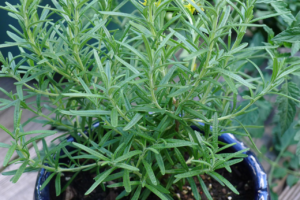 Rosemary’s woody scent is overwhelming to mosquitoes, as well as cabbage moths and carrot flies, so they’ll surely stay away. While you can plant it in your garden, rosemary does best in a container, making it easy for you to transport it inside when temperatures are low, and bring it outside when you need a natural repellant. If you have a fireplace or fire pit, you can place the herb in the fire (near the smoke), and use its aroma to drive mosquitoes away. It will be highly pleasant for you, though! One of the most effective ways to use rosemary is in the form of an oil. To make your own mosquito repellant spray, simply mix four drops of rosemary essential oil and ¼ cup of olive oil and store it in a cool, dry place. Voila! All-natural repellant from your own backyard. To grow rosemary: Rosemary needs full sun and well-draining soil to grow well. At maturity, rosemary can grow up to five feet tall, so be sure it has the space to flourish properly.
Rosemary’s woody scent is overwhelming to mosquitoes, as well as cabbage moths and carrot flies, so they’ll surely stay away. While you can plant it in your garden, rosemary does best in a container, making it easy for you to transport it inside when temperatures are low, and bring it outside when you need a natural repellant. If you have a fireplace or fire pit, you can place the herb in the fire (near the smoke), and use its aroma to drive mosquitoes away. It will be highly pleasant for you, though! One of the most effective ways to use rosemary is in the form of an oil. To make your own mosquito repellant spray, simply mix four drops of rosemary essential oil and ¼ cup of olive oil and store it in a cool, dry place. Voila! All-natural repellant from your own backyard. To grow rosemary: Rosemary needs full sun and well-draining soil to grow well. At maturity, rosemary can grow up to five feet tall, so be sure it has the space to flourish properly.
2. Peppermint
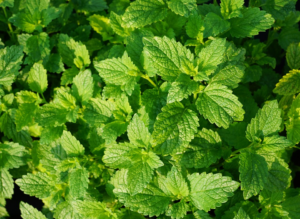 The strong scent of peppermint is a known mosquito repellant as well. Peppermint also repels spiders, and is toxic to mosquito larvae. Talk about a win-win-win! If planted in your garden, be sure to keep a close eye on this plant — it can be a bit invasive if not properly maintained. Like rosemary, peppermint is most effective in the form of an oil. Mix a few drops of peppermint oil into a spray bottle filled with water and a bit of vinegar, and shake well before use. You can also add a few drops of peppermint to your body lotion to repel mosquitoes, whichever you prefer. If you find yourself with a mosquito bite, use peppermint — either the oil or a leaf — and rub it on the bite. You should have relief in minutes! To grow peppermint: Peppermint needs full sun and damp soil to grow. At maturity, peppermint can grow up to three feet tall.
The strong scent of peppermint is a known mosquito repellant as well. Peppermint also repels spiders, and is toxic to mosquito larvae. Talk about a win-win-win! If planted in your garden, be sure to keep a close eye on this plant — it can be a bit invasive if not properly maintained. Like rosemary, peppermint is most effective in the form of an oil. Mix a few drops of peppermint oil into a spray bottle filled with water and a bit of vinegar, and shake well before use. You can also add a few drops of peppermint to your body lotion to repel mosquitoes, whichever you prefer. If you find yourself with a mosquito bite, use peppermint — either the oil or a leaf — and rub it on the bite. You should have relief in minutes! To grow peppermint: Peppermint needs full sun and damp soil to grow. At maturity, peppermint can grow up to three feet tall.
3. Basil
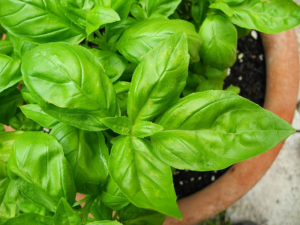 Not only is basil a delicious herb, but also one of the plants that naturally repels mosquitoes. Contrary to the two plants we have discussed so far, basil is most effective in its natural form. This herb emits its own pungent aroma, which works to deter mosquitoes as well as flies. Its leaves are also toxic to mosquito larvae, so we recommend planting basil around areas with standing water to keep mosquitoes from laying eggs. Lemon and cinnamon basil have proven to work the best because of their strong fragrances, but any variety of basil will do the job! To grow basil: Basil likes full sun, well-draining soil, and to be kept damp. This herb will thrive in your garden or in a container, and can reach two feet in height when fully grown.
Not only is basil a delicious herb, but also one of the plants that naturally repels mosquitoes. Contrary to the two plants we have discussed so far, basil is most effective in its natural form. This herb emits its own pungent aroma, which works to deter mosquitoes as well as flies. Its leaves are also toxic to mosquito larvae, so we recommend planting basil around areas with standing water to keep mosquitoes from laying eggs. Lemon and cinnamon basil have proven to work the best because of their strong fragrances, but any variety of basil will do the job! To grow basil: Basil likes full sun, well-draining soil, and to be kept damp. This herb will thrive in your garden or in a container, and can reach two feet in height when fully grown.
4. Lemon Balm
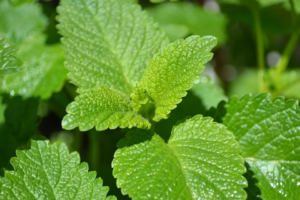 Lemon balm is an herb in the mint family that contains large amounts of citronella — sometimes up to 38 percent citronella content! It is often used in herbal teas and has been described as having an incense-like odor. While it repels mosquitoes and fleas, lemon balm is known for attracting pollinators such as bees and butterflies. Learn more about attracting butterflies in our blog, How To Attract Butterflies To Your Garden. To grow lemon balm: This herb needs full sun to partial shade with well-draining soil. Lemon balm can be quite invasive in your garden, so be sure to maintain it properly.
Lemon balm is an herb in the mint family that contains large amounts of citronella — sometimes up to 38 percent citronella content! It is often used in herbal teas and has been described as having an incense-like odor. While it repels mosquitoes and fleas, lemon balm is known for attracting pollinators such as bees and butterflies. Learn more about attracting butterflies in our blog, How To Attract Butterflies To Your Garden. To grow lemon balm: This herb needs full sun to partial shade with well-draining soil. Lemon balm can be quite invasive in your garden, so be sure to maintain it properly.
5. Catnip
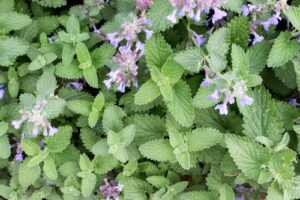 Catnip is actually 10 times more effective than DEET (an ingredient commonly found in bug spray) and is certainly one of the most effective mosquito repelling plants on this list. This plant is also useful for repelling termites and cockroaches, two other offenders you do not want around your home. Like the name suggests, catnip will attract cats to your yard. If you have cats of your own, be careful not to plant it too close to your other flowers, as they will most certainly roll around in their new euphoric state. To grow catnip: Keep catnip in an area in your garden with full sun to partial shade, and make sure the soil is well-draining. While it’s easy to grow, catnip can be quite invasive when left unattended.
Catnip is actually 10 times more effective than DEET (an ingredient commonly found in bug spray) and is certainly one of the most effective mosquito repelling plants on this list. This plant is also useful for repelling termites and cockroaches, two other offenders you do not want around your home. Like the name suggests, catnip will attract cats to your yard. If you have cats of your own, be careful not to plant it too close to your other flowers, as they will most certainly roll around in their new euphoric state. To grow catnip: Keep catnip in an area in your garden with full sun to partial shade, and make sure the soil is well-draining. While it’s easy to grow, catnip can be quite invasive when left unattended.
6. Garlic
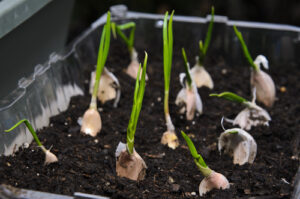 There once was a rumor floating around that eating a diet high in garlic would instantly protect you from mosquitoes. Unfortunately that myth was busted, but planting a couple of these plants in your garden will help you ward them off — aphids and ants, too! To grow garlic: Garlic needs full sun with well-draining soil, and can grow up to two feet in height. If you’re interested in growing garlic in your garden, here are some helpful tips for harvesting it.
There once was a rumor floating around that eating a diet high in garlic would instantly protect you from mosquitoes. Unfortunately that myth was busted, but planting a couple of these plants in your garden will help you ward them off — aphids and ants, too! To grow garlic: Garlic needs full sun with well-draining soil, and can grow up to two feet in height. If you’re interested in growing garlic in your garden, here are some helpful tips for harvesting it.
7. Citronella
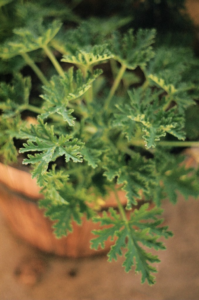 Citronella is one of the most common mosquito repelling plants. The strong scent from this plant helps to mask other scents that attract mosquitoes, such as carbon dioxide from our breath. Variations of this plant include citronella grass and citrosum, both of which are effective plants that naturally repel mosquitoes. To grow citronella: Citronella needs full sun to partial shade to grow, as well as well-draining soil. It’s a relatively low maintenance plant, so you shouldn’t have to do much to reap its benefits!
Citronella is one of the most common mosquito repelling plants. The strong scent from this plant helps to mask other scents that attract mosquitoes, such as carbon dioxide from our breath. Variations of this plant include citronella grass and citrosum, both of which are effective plants that naturally repel mosquitoes. To grow citronella: Citronella needs full sun to partial shade to grow, as well as well-draining soil. It’s a relatively low maintenance plant, so you shouldn’t have to do much to reap its benefits!
8. Marigolds
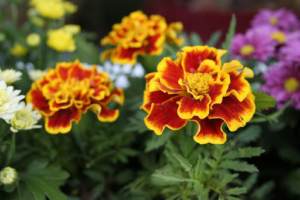 In addition to being beautiful pops of color, marigolds have pyrethrum in them, which is an ingredient used in many insect repellents. Planting them throughout your flowerbed will add some beautiful character (and a functional mosquito guard) to your outdoor festivities. These flowers will also deter deer and rabbits, while attracting beneficial insects like butterflies and bees. To grow marigolds: Keep these easy-to-grow plants in full sun with well-draining soil.
In addition to being beautiful pops of color, marigolds have pyrethrum in them, which is an ingredient used in many insect repellents. Planting them throughout your flowerbed will add some beautiful character (and a functional mosquito guard) to your outdoor festivities. These flowers will also deter deer and rabbits, while attracting beneficial insects like butterflies and bees. To grow marigolds: Keep these easy-to-grow plants in full sun with well-draining soil.
9. Bee Balm
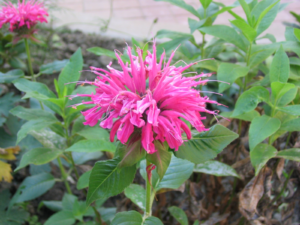 Also known as bergamot and horsemint, bee balm is highly effective for deterring mosquitoes. It’s also an ideal snack for hummingbirds, bees, and butterflies. If you desire, you can even use bee balm in jellies, teas, and as a delicious garnish for salads. To repel mosquitoes, crush the leaves of this plant to release its fragrant oils. To grow bee balm: Plant bee balm in an area with full sun, and in well-draining soil. Keep in mind this plant can grow up to four feet in height, so make sure it has plenty of space.
Also known as bergamot and horsemint, bee balm is highly effective for deterring mosquitoes. It’s also an ideal snack for hummingbirds, bees, and butterflies. If you desire, you can even use bee balm in jellies, teas, and as a delicious garnish for salads. To repel mosquitoes, crush the leaves of this plant to release its fragrant oils. To grow bee balm: Plant bee balm in an area with full sun, and in well-draining soil. Keep in mind this plant can grow up to four feet in height, so make sure it has plenty of space.
10. Floss Flower
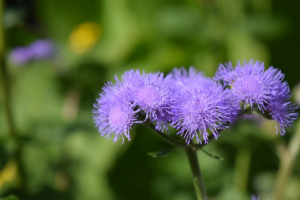 These beautiful flowers are the perfect addition to any garden, and are typically used as an edging plant. Floss flowers contain a chemical called coumarin, a common ingredient in many mosquito repellants. However, this chemical is toxic to animals and humans if ingested, so consider the placement of floss flowers if you have pets at home, or inquisitive wildlife that frequents your yard. To grow floss flowers: This flower needs full sun and partial shade to grow, and well-draining soil. It comes in a variety of colors, including blue, pink, white, and purple.
These beautiful flowers are the perfect addition to any garden, and are typically used as an edging plant. Floss flowers contain a chemical called coumarin, a common ingredient in many mosquito repellants. However, this chemical is toxic to animals and humans if ingested, so consider the placement of floss flowers if you have pets at home, or inquisitive wildlife that frequents your yard. To grow floss flowers: This flower needs full sun and partial shade to grow, and well-draining soil. It comes in a variety of colors, including blue, pink, white, and purple.
11. Lavender
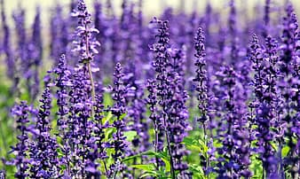 At Killingsworth, we love lavender for quite a few reasons. Not only is it beautiful, but it’s also great for cleaning your bathroom, eliminating bed bugs, and keeping mosquitoes, moths, fleas, flies, and spiders away. It’s truly the plant that can do it all! Best used in the form of an oil, add a few drops of lavender to a spray bottle filled with water and witch hazel and shake well. You can also apply lavender directly to your skin to soothe itchy bites, or simply to take advantage of its aromatic stress relieving benefits. To grow lavender: Keep lavender in an area with full sun and plant in well-draining soil.
At Killingsworth, we love lavender for quite a few reasons. Not only is it beautiful, but it’s also great for cleaning your bathroom, eliminating bed bugs, and keeping mosquitoes, moths, fleas, flies, and spiders away. It’s truly the plant that can do it all! Best used in the form of an oil, add a few drops of lavender to a spray bottle filled with water and witch hazel and shake well. You can also apply lavender directly to your skin to soothe itchy bites, or simply to take advantage of its aromatic stress relieving benefits. To grow lavender: Keep lavender in an area with full sun and plant in well-draining soil.
12. Lemongrass
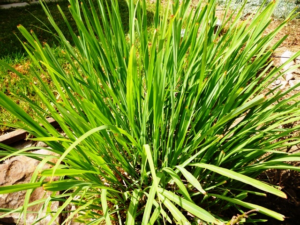 Like some of the other mosquito repelling plants on this list, lemongrass, also known as lemon verbena, is toxic to mosquito larvae. Plant lemongrass near areas with standing water to deter mosquitoes from laying their eggs. It’s important to note that lemongrass is not safe for pregnant women, as this type of plant is known to cause birth defects. To grow lemongrass: Lemon verbena needs full sun and well-draining soil to thrive, and can reach up to six feet in height when fully grown.
Like some of the other mosquito repelling plants on this list, lemongrass, also known as lemon verbena, is toxic to mosquito larvae. Plant lemongrass near areas with standing water to deter mosquitoes from laying their eggs. It’s important to note that lemongrass is not safe for pregnant women, as this type of plant is known to cause birth defects. To grow lemongrass: Lemon verbena needs full sun and well-draining soil to thrive, and can reach up to six feet in height when fully grown.
13. Sage
 Cleanse your yard of mosquitoes by burning sage! Throw sage into a backyard fire pit or fireplace to fill your space with its mosquito-repelling aromas. Burning sage is the only way this plant will deter mosquitoes from your lawn. However, in its natural state, sage is effective for repelling ticks and attracting hummingbirds. To grow sage: Plant sage in an area with full sun and well-draining soil.
Cleanse your yard of mosquitoes by burning sage! Throw sage into a backyard fire pit or fireplace to fill your space with its mosquito-repelling aromas. Burning sage is the only way this plant will deter mosquitoes from your lawn. However, in its natural state, sage is effective for repelling ticks and attracting hummingbirds. To grow sage: Plant sage in an area with full sun and well-draining soil.
14. Scented Geranium
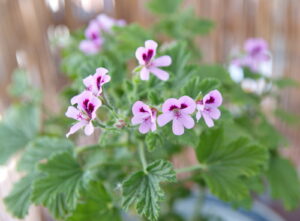 Geraniums have a slight lemony smell, which is useful for deterring a wide range of insects. They also contain a small portion of citronella oil, making them even more effective for mosquito deterrence. Pot geraniums in a container or plant in your garden for an extra pop of color around your home. Fun fact, geranium oil can be used to remove scars, too! To grow scented geranium: Full sun to partial shade is required for this plant, and make sure its soil is well-draining.
Geraniums have a slight lemony smell, which is useful for deterring a wide range of insects. They also contain a small portion of citronella oil, making them even more effective for mosquito deterrence. Pot geraniums in a container or plant in your garden for an extra pop of color around your home. Fun fact, geranium oil can be used to remove scars, too! To grow scented geranium: Full sun to partial shade is required for this plant, and make sure its soil is well-draining.
15. Pennyroyal
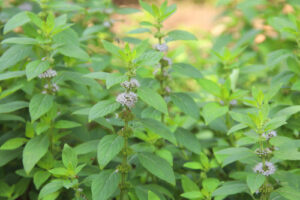 Flies, fleas, and mosquitoes steer clear of pennyroyal. To effectively use this mosquito repelling plant, crush the leaves of pennyroyal and place them in your pockets. However, it’s important to note that this plant has been found to be toxic to infants and pregnant women, so we recommend choosing one of the other mosquito repelling plants on this list if you are expecting a child, or have small children at home. To plant pennyroyal: This plant needs full sun to partial shade and damp soil to grow.
Flies, fleas, and mosquitoes steer clear of pennyroyal. To effectively use this mosquito repelling plant, crush the leaves of pennyroyal and place them in your pockets. However, it’s important to note that this plant has been found to be toxic to infants and pregnant women, so we recommend choosing one of the other mosquito repelling plants on this list if you are expecting a child, or have small children at home. To plant pennyroyal: This plant needs full sun to partial shade and damp soil to grow.
16. Allium
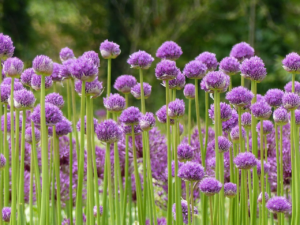 Surprisingly enough, allium flowers are actually a part of the onion, shallot, and garlic family. Because of this, alliums produce a strong scent that mosquitoes, deer, and rodents don’t like. These flowers make a beautiful addition to any garden, and are commonly used in flower bouquets. To grow allium: Allium flowers need full sun and well-draining soil. They are highly drought tolerant, and overall very easy to maintain with minimal care.
Surprisingly enough, allium flowers are actually a part of the onion, shallot, and garlic family. Because of this, alliums produce a strong scent that mosquitoes, deer, and rodents don’t like. These flowers make a beautiful addition to any garden, and are commonly used in flower bouquets. To grow allium: Allium flowers need full sun and well-draining soil. They are highly drought tolerant, and overall very easy to maintain with minimal care.
Mosquito Control For Your Home
If you’re like us, finding ways to naturally repel mosquitoes — or any other insect for that matter — is important. While these plants that naturally repel mosquitoes are known to be effective, you may need to take your efforts one step further. At Killingsworth, we know how to get rid of mosquitoes without the use of excessive chemicals. We’ll start by first identifying and eliminating mosquito habitats to ensure your home stays mosquito-free, even after we’re gone. Then, we’ll target them by spraying a residual based solution to make sure mosquitoes stay far, far away. If you’re interested in mosquito control for your home, give us a call. We would be happy to answer any questions you may have about our pest control services and discuss our pricing plans.